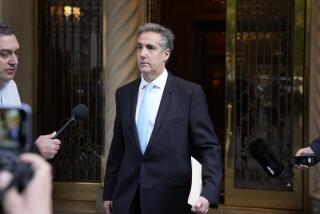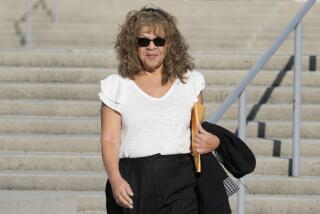Testimony Concludes in Hedgecock Trial : San Diego Mayor Says Campaign Data Mistakes Were Inadvertent
- Share via
SAN DIEGO — Testimony in the felony trial of Mayor Roger Hedgecock concluded on Thursday, as Hedgecock emphasized to the jury that any errors on his personal or campaign financial statements were inadvertent ones that his attorney described as “not . . . the end of the world.”
Saying “it’s now up to the jury, the judge and the lawyers,” Hedgecock expressed confidence that the jury will believe what he called his “logical, sensible explanations” in his felony perjury and conspiracy trial. The opposing lawyers’ closing arguments in the case are expected early next week.
Funds Transferred
As he completed nearly 6 1/2 hours of testimony over a three-day period, Hedgecock, reinforced by a surprise defense witness, also sought to prove that, contrary to prosecutors’ charges, he had properly repaid a $130,000 oral agreement loan from former investment executive Nancy Hoover that was used to renovate the mayor’s South Mission Hills house.
The loan from Hoover, a former principal in the now-bankrupt La Jolla investment firm of J. David & Co., is a major issue in the trial and was the subject of repeated clashes between Hedgecock and Assistant Dist. Atty. Richard D. Huffman.
Hedgecock testified that he repaid Hoover by transferring a $50,000 J. David account to her and through the sale of an undeveloped piece of property in San Diego.
During his cross-examination, however, Huffman suggested that Hoover’s loan was actually a gift and contended that the transfer of the $50,000 investment account--a transaction that the mayor said he told Hoover to execute in October, 1983--never occurred.
Under questioning from Huffman, Hedgecock testified that Hoover forgot to make the transfer until he reminded her of the matter late the following month and conceded that he had not documented the transfer in writing.
“I didn’t even think of that,” Hedgecock said. “She was the broker (who) opened the account; she was a friend of mine, and she was the one lending me (the $130,000). She never indicated that it was necessary to give anything in writing.”
Bolstered Version
A former J. David employee later bolstered Hedgecock’s version of the transfer of the $50,000 account.
Anne Kinahan, an Irish citizen who formerly worked for J. David & Co. in London and Switzerland, testified that she had received a Dec. 1, 1983, document instructing her to switch Hedgecock’s account to Hoover’s name.
Flown to San Diego two days ago by defense attorney Michael Pancer, Kinahan explained that the account was officially transferred to Hoover in December, 1983.
Kinahan added that she located the December, 1983, document authorizing the transfer among records seized in Switzerland by federal officials when J. David & Co. was forced into involuntary bankruptcy in February, 1984.
The perjury counts against Hedgecock allege that he intentionally falsified personal and campaign financial disclosure statements in an attempt to conceal his ties to Hoover and former financier J. David (Jerry) Dominelli, founder of the investment firm that bore his name.
Came Under Scrutiny
One of the prosecution’s major contentions is that Hedgecock conspired with Hoover and Dominelli in a scheme to funnel tens of thousands of dollars in illegal contributions to his 1983 campaign via a political consulting firm owned by Tom Shepard, a close friend of the mayor. The prosecution contends the $130,000 from Hoover is part of that scheme.
Shortly after his finances came under scrutiny by local and state officials in 1984, Hedgecock filed more than one dozen amendments to his previous personal and campaign finance reports. Noting that such amendments are relatively common, Hedgecock testified that his amended statements corrected “inadvertent” errors and omissions and demonstrate his good-faith effort to comply with complex regulations.
Huffman, however, emphasized that Hedgecock had signed the original statements under oath and penalty of perjury.
“So you knew that it was an important event to sign your name to that statement?” Huffman asked.
“I did, it was and I understood it, and those reports at the time I filed them were filled out to the best of my ability,” Hedgecock replied.
More to Read
Sign up for Essential California
The most important California stories and recommendations in your inbox every morning.
You may occasionally receive promotional content from the Los Angeles Times.













